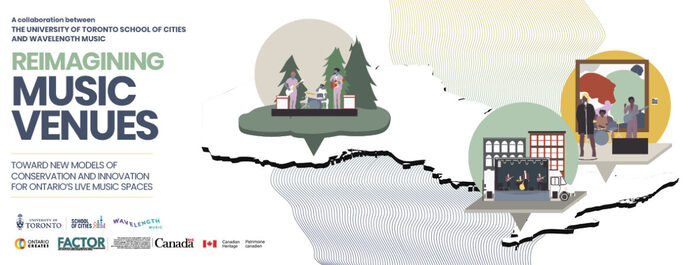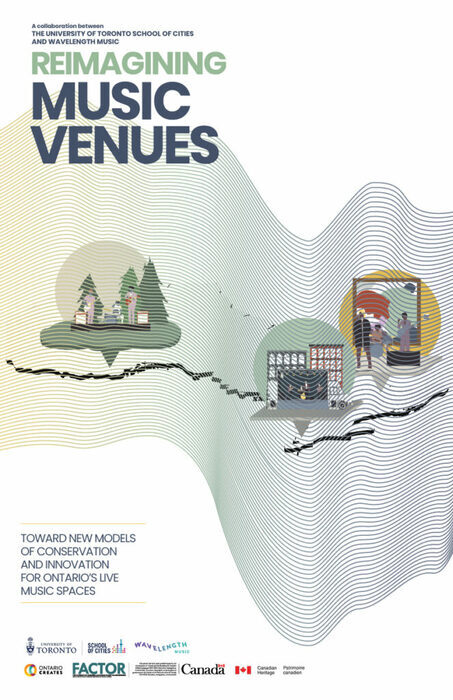
Toward new models of conservation and innovation
for Ontario’s live music spaces
Ontario’s live music venues have long served as dynamic community centres, economic catalysts, and cultural enclaves. These integral hubs of our music ecosystem contribute considerably to the province’s rich cultural fabric. Yet, this ecosystem is at a critical juncture. Musicians, presenters, and venue owners/operators face increasing difficulties in realizing the true value they generate, which stifles the growth and diversification of this sector.
In this report, Professor Dan Silver of the University of Toronto Scarborough Department of Sociology and School of Cities, and Jonathan Bunce of Wavelength Music propose a path towards new models of conservation and innovation for Ontario’s live music spaces.
Extensive coverage in media, policy, and research reports for Reimagining Music Venues:
EXECUTIVE SUMMARY
Ontario’s live music venues have long served as dynamic community centres, economic catalysts, and cultural enclaves. These integral hubs of our music ecosystem contribute considerably to the province’s rich cultural fabric. Yet, this ecosystem is at a critical juncture. Musicians, presenters, and venue owners/operators face increasing difficulties in realizing the true value they generate, which stifles the growth and diversification of this sector.
Industry Challenges
• Pre-COVID Struggles: Even before the pandemic, the industry witnessed more venue closures than openings, accompanied by escalating ticket prices and fewer shows. The reduced perceived monetary value from audiences, insufficient compensation for artists, and growing operational costs for owner/operators present a significant challenge for venues.
• Impact of the Pandemic: COVID-19 exacerbated these issues, pushing many smaller venues to the brink of closure, with Toronto witnessing a 13% closure rate.
• Public Sentiment: 75% of survey respondents consider local music venues as endangered or threatened.
Opportunities for Reimagining in the Wake of COVID-19
The pandemic served as a catalyst for artists to dedicate more time to their craft and skill development. Moreover, it highlighted the frailties in the economic models underpinning many existing venues. In response, policy adaptations in the wake of COVID opened new streams of public funding and initiated a rethinking of live music’s place in cultural policy frameworks. The relaxation of traditionally stringent regulations led to a blossoming of musical performances in outdoor spaces both public and private. This presents a unique opportunity to revise zoning, land use, and licensing to facilitate diverse musical entrepreneurs.
This study comprehensively analyzes Ontario’s music ecosystem, focusing on the venues that anchor it. Weaving together data analysis, stakeholder surveys, interviews, a design-focused capstone project, and a literature review, we identify significant industry challenges, underscore the community value of music venues, and emphasize the importance of diversification and inclusivity.
Key Findings
- Financial Constraints: The core participants in the live music sector in Ontario — artists, presenters, and venue owners/operators — are struggling to grow and diversify the industry due to the steep costs of rent, property, insurance, and living expenses. Despite the value they generate, capturing adequate revenue remains a challenge.
- Market Dysfunction: A market incompatibility exists with audiences feeling overcharged, musicians feeling underpaid, and venue owners/operators burdened with high costs.
- Declining Venues and Shows: Even before the pandemic, the number of active venues and shows was declining. However, ticket prices have been on a steady rise since 2012.
- Downtown Concentrations: Most Ontario cities find their music venues concentrated in their downtown areas. Yet Ottawa is an outlier, with venues scattered throughout the city. This might explain why more stakeholders in Ottawa believe that their city’s venues reflect the diversity of their communities than in other cities.
- Community Value: Community members appreciate the accessibility, community creation, preservation of local culture, and promotion of local art that can be provided by live music venues, and demand higher standards in basic amenities such as sound quality, water, and bathroom access. They wish for a venue experience that prioritizes quality musical performances at reasonable prices, with a keen interest in new spaces with a healthy and clean environment.
Innovative Venue Models
The survey revealed a need for novel venue models that intertwine preservation and innovation. We identify and explore five potential models:
- The Stage Truck: a self-sufficient, mobile stage that can bring portable live music infrastructure to outdoor, public areas, particularly outside the downtown core where such permanent infrastructure is more of a financial risk
- Everywhere’s a Venue: hosting live music events in spaces not conceived as venues (including parks, churches, parking lots, construction sites, and beaches), providing an alternative to the licensed bar environment
- Multidisciplinary Arts Centres: typically involving a music presenter or venue partnering with arts groups working in other disciplines, such as film, dance, theatre, comedy, and visual art
- Music Centres: similar to the multidisciplinary arts centre, but involving a clustering of music-specific uses, such as a venue (or multiple venues) at the heart of a building that could also incorporate rehearsal space, recording studios, workshop/educational space, cafe/socializing space, or office space for music businesses or companies
- Cultural Land Trusts: a model in which members of a community work together to raise funds or otherwise gain ownership of property by a non-profit trust, which then sells or leases buildings or space to community members at perpetually affordable rates
Policy Recommendations
Since 2014, at least 12 policy reports or studies have directly addressed live music in Ontario. We identify points of consensus along with gaps that have hindered the live music policy conversation in Ontario from moving beyond ideation and capacity-building toward generating evidence and action. Building on this existing work, our recommendations come in three steps:
- Consolidation: recurrent themes and recommendations that represent an emerging “music ecosystem consensus” including a suite of policy recommendations that range from the specific (such as appointing municipal music officers, designating parking and loading zones, or offering property tax subsidies) to the general (such as increasing grant funding, using underutilized spaces, and increasing data collection)
- Evaluation: offering three recommendations designed to establish regular data collection from Ontario’s live music stakeholders:
- Creating a Live Music Ecosystem Observatory (LMEO) by partnering with industry stakeholders and universities
- Evaluating the effectiveness of common recommendations, such as: creating Music Offices; creating Agent of Change policies, changing zoning rules to create new infrastructure
- Conducting formal cost benefit analyses to guide public expenditures on cultural infrastructure
- Implementation: proposing four significant initiatives that could consolidate existing efforts into more effective platforms for supporting live music in Ontario and indeed in Canada as a whole:
- Building the Stage Truck — or a fleet of Stage Trucks — within municipalities
- Creating a new provincial charitable organization: the Ontario Space for Music Foundation
- Examining new funding models for live music, building on the success of pandemic recovery programs
- Advocating for a Cultural Renaissance 2.0, a successor to Ontario’s set of ambitious cultural infrastructure projects undertaken in the early 2000s as part of the SuperBuild program, to be defined by repurposing and animating existing spaces, or integrating culture into new mixed-use projects
This research underscores the importance of fostering an adaptable and resilient live music ecosystem in Ontario. As we move forward, our focus should remain on mitigating existing challenges while innovating and evolving with new venue models. The proposed policy recommendations aim to provide practical paths toward this goal, offering a transformative blueprint to uplift and revitalize the Ontario live music scene. This endeavour, although complex, holds the promise of a more vibrant and sustainable live music industry, resonating powerfully with the broader cultural and economic vibrancy of the province.

